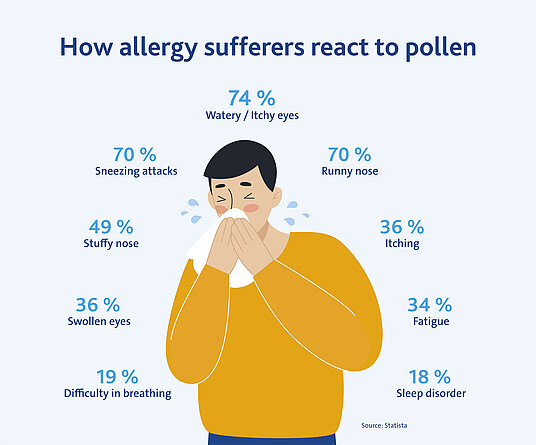It’s That Time of Year Again: Check Out These Tips for Allergy Sufferers
Ugggh … itchy eyes. Twitchy nose. Scratchy throat. Uh-oh, it’s that time of year AGAIN — allergy season. If you struggle with allergies, you’re not alone. According to the CDC, seasonal allergies affect nearly 60 million people in the U.S. each year. In the Metro DC area, the Juniper and Elm trees are already blooming, with others following behind (Murillo). In the coming weeks, we will experience a mix of tree and grass pollen. This can trigger an allergic response in our bodies. The most common responses are itchy eyes, ears and throats, along with runny noses, sneezing, coughing and post-nasal drip. At times, these symptoms can mimic a cold — so which is it? The Mayo Clinic offers a quick comparison between colds and allergies. When in doubt, seek treatment from a medical professional.
The best way to get through this season is to develop and execute an action plan. The Mayo Clinic offers the following simple strategies to keep seasonal allergies under control. In addition to proactively taking any allergy medications, consider the following:
Reduce your exposure to triggers:
- If possible, avoid outdoor chores such as yard work, as they can stir up pollen. If they are unavoidable, be sure to mask up.
- Shower when you come indoors from being outside. This will get the pollen off of your clothes and your body.
- Give your dog a good wipe-down after their walk. Pollen sticks to their fur and paws.
Check the pollen count:
- Checking the pollen count will help you plan your day. AccuWeather can keep you updated on the levels for your area.
- Pollen counts tend to be higher in the morning, so try to schedule any outdoor activities for later in the day.
- Keep doors and windows closed at night, when pollen is predicted to be high.
Maintain high-quality air indoors:
- Rather than opening the window, use air conditioning in your home and car if available.
- Be sure to use high-quality filters and maintain a schedule for changing them. Use a portable high-efficiency particulate air (HEPA) filter in your bedroom. Clean floors regularly with a vacuum cleaner that has a HEPA filter.
- Keep indoor air dry with a dehumidifier.
For more allergy tips, revisit CommonHealth’s Breathe Well campaign booklet and the CDC’s Allergens and Pollen resources. Not only does allergy season trigger congestion and overall discomfort, but multiple studies have also shown that allergies impact students’ school performance, affect employees’ productivity at work, and can even result in more emergency room visits, especially for people suffering from asthma or other respiratory conditions. For those who have chronic health issues, seek guidance and treatment from a medical professional.

Submitted by:
Dahlia Henry-Tett, Chief Wellness Officer (CWO), employeewellbeing@nvcc.edu
